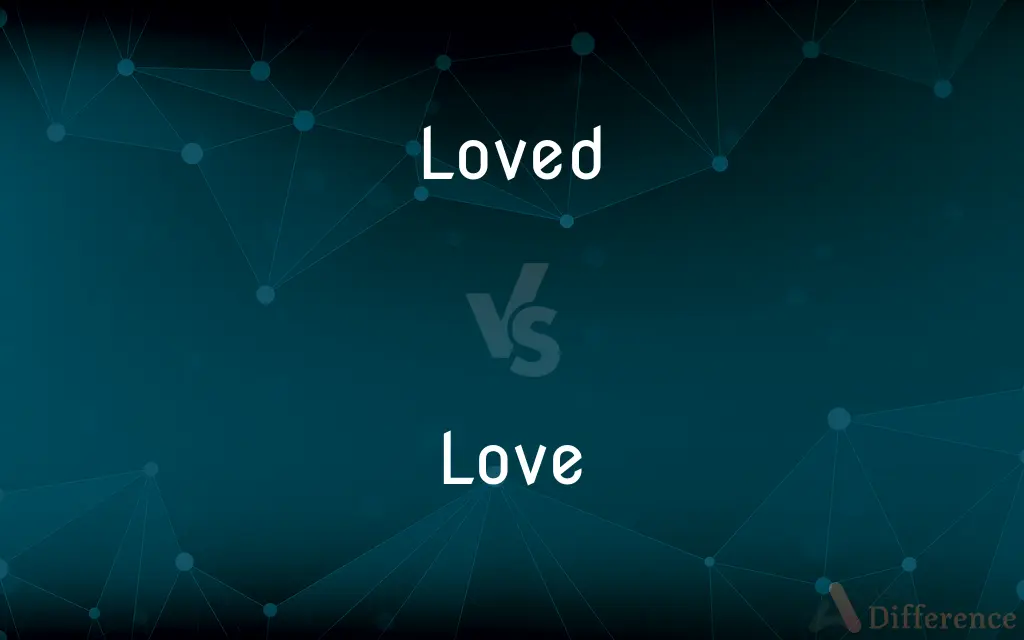Loved vs. Love — What's the Difference?
By Tayyaba Rehman — Updated on October 27, 2023
Loved is the past tense and past participle of love, indicating affection felt in the past. Love is an intense feeling of deep affection or a verb indicating the action of feeling this emotion.

Difference Between Loved and Love
Table of Contents
ADVERTISEMENT
Key Differences
Loved, as the past form of love, signifies affection that was felt or actions that were done in the past. Love, in contrast, can be a present-tense verb or a noun representing a current, ongoing emotion or state.
Loved often conveys actions or feelings that have been completed. Love, however, can describe current feelings or ongoing actions, such as loving someone or something right now. When someone says they loved, it implies a past scenario, whereas saying they love indicates present feelings.
In grammatical terms, loved is the past tense and past participle form used in different tenses. Love, however, is the base form, serving as a present tense verb and a noun. Loved often appears in perfect tenses or passive forms, while love is used in simple present or as a noun.
The use of loved can imply change or a past condition that may or may not persist. Love, when used as a verb, suggests an active, present state of feeling. As a noun, it embodies a more timeless, enduring concept.
Using loved can sometimes indicate a nostalgic or reflective tone, looking back at past emotions. Love, on the other hand, can carry a sense of immediacy and current engagement, whether in the form of a noun or verb.
ADVERTISEMENT
Comparison Chart
Grammatical Form
Past tense and past participle.
Base form, present tense verb, or noun.
Time Reference
Indicates past affection or action.
Indicates current affection, action, or state.
Use in Tenses
Used in past, perfect, and passive constructions.
Used in present tense and as a noun.
Implication
May imply change or a past condition.
Suggests ongoing or current state.
Tone
Often carries a nostalgic or reflective tone.
Carries immediacy and current engagement.
Compare with Definitions
Loved
Felt deep affection for in the past.
She loved her childhood dog dearly.
Love
Intense feeling of deep affection.
Her love for her children was evident.
Loved
A strong feeling of affection and concern toward another person, as that arising from kinship or close friendship.
Love
Love encompasses a range of strong and positive emotional and mental states, from the most sublime virtue or good habit, the deepest interpersonal affection, to the simplest pleasure. An example of this range of meanings is that the love of a mother differs from the love of a spouse, which differs from the love of food.
Loved
A strong feeling of affection and concern for another person accompanied by sexual attraction.
Love
A strong feeling of affection and concern toward another person, as that arising from kinship or close friendship.
Loved
A feeling of devotion or adoration toward God or a god.
Love
A strong feeling of affection and concern for another person accompanied by sexual attraction.
Loved
A feeling of kindness or concern by God or a god toward humans.
Love
A feeling of devotion or adoration toward God or a god.
Loved
Often Love(Christianity) Charity.
Love
A feeling of kindness or concern by God or a god toward humans.
Loved
Sexual desire or activity
The pleasures of love.
A night of love.
Love
Often Love(Christianity) Charity.
Loved
An instance of being in love
Teenage loves can be as fleeting as they are intense.
Love
Sexual desire or activity
The pleasures of love.
A night of love.
Loved
A person for whom one has strong feelings of affection
She met her new love at the restaurant.
Love
An instance of being in love
Teenage loves can be as fleeting as they are intense.
Loved
Used as a term of endearment for such a person.
Love
A person for whom one has strong feelings of affection
She met her new love at the restaurant.
Loved
An intense emotional attachment to something, as to a pet or treasured object.
Love
Used as a term of endearment for such a person.
Loved
An expression of one's affection
Send him my love.
Love
An intense emotional attachment to something, as to a pet or treasured object.
Loved
A strong predilection or enthusiasm
A love of language.
Love for the game of golf.
Love
An expression of one's affection
Send him my love.
Loved
The object of such an enthusiasm
The outdoors is her greatest love.
Love
A strong predilection or enthusiasm
A love of language.
Love for the game of golf.
Loved
Love(Mythology) Eros or Cupid.
Love
The object of such an enthusiasm
The outdoors is her greatest love.
Loved
(Sports) A score of zero, as in tennis.
Love
Love(Mythology) Eros or Cupid.
Loved
To feel love for (a person)
We love our parents. I love my friends.
Love
(Sports) A score of zero, as in tennis.
Loved
To feel sexual love for (a person).
Love
To feel love for (a person)
We love our parents. I love my friends.
Loved
To feel devotion to (God or a god).
Love
To feel sexual love for (a person).
Loved
To feel or show kindness or concern to (a person). Used of God or a god.
Love
To feel devotion to (God or a god).
Loved
To have an intense emotional attachment to
Loves his house.
Love
To feel or show kindness or concern to (a person). Used of God or a god.
Loved
To embrace or caress
They were loving each other on the sofa.
Love
To have an intense emotional attachment to
Loves his house.
Loved
To have sexual intercourse with.
Love
To embrace or caress
They were loving each other on the sofa.
Loved
To like or desire enthusiastically
Loves swimming.
Love
To have sexual intercourse with.
Loved
To thrive on; need
The cactus loves hot, dry air.
Love
To like or desire enthusiastically
Loves swimming.
Loved
To feel love or sexual love for another.
Love
To thrive on; need
The cactus loves hot, dry air.
Loved
Simple past tense and past participle of love
Love
To feel love or sexual love for another.
Loved
Being the object of love.
Love
(uncountable) A deep caring for the existence of another.
Loved
Held dear;
His loved companion of many years
Love
(uncountable) Strong affection.
Loved
Cherished or held dear previously.
He loved his time in Paris.
Love
A profound and caring affection towards someone.
A mother’s love is not easily shaken.
My husband’s love is the most important thing in my life.
Loved
Enjoyed or took great pleasure in previously.
They loved skiing every winter.
Love
Affectionate, benevolent concern or care for other people or beings, and for their well-being.
Loved
Cared deeply for someone or something in the past.
She loved her job before retiring.
Love
A feeling of intense attraction towards someone.
I have never been in love as much as I have with you.
Loved
Had a profound affection for someone or something earlier.
He always loved reading classic novels.
Love
A deep or abiding liking for something; an enthusiasm for something.
My love of cricket knows no bounds.
Love
(countable) A person who is the object of romantic feelings; a darling, a sweetheart, a beloved.
Love
A term of friendly address, regardless of feelings.
Hello love, how can I help you?
Love
A thing, activity, etc. which is the object of one's deep liking or enthusiasm.
Love
(euphemistic) Sexual desire; attachment based on sexual attraction.
Love
(euphemistic) Sexual activity.
Love
An instance or episode of being in love; a love affair.
Love
Used as the closing, before the signature, of a letter, especially between good friends or family members, or by the young.
Love
(obsolete) A thin silk material.
Love
A climbing plant, Clematis vitalba.
Love
Zero, no score.
So that’s fifteen-love to Kournikova.
Love
Nothing; no recompense.
Love
To have a strong affection for (someone or something).
I love my spouse.
I love you!
I love that song!
Love
(transitive) To need, thrive on.
Mold loves moist, dark places.
Love
(transitive) To be strongly inclined towards something; an emphatic form of like.
I love walking barefoot on wet grass;
I'd love to join the team;
I love what you've done with your hair
Love
To care deeply about, to be dedicated to (someone or something).
Love
(transitive) To derive delight from a fact or situation.
I love the fact that the coffee shop now offers fat-free chai latte.
Love
To have sex with (perhaps from make love).
I wish I could love her all night long.
Love
A feeling of strong attachment induced by that which delights or commands admiration; preëminent kindness or devotion to another; affection; tenderness; as, the love of brothers and sisters.
Of all the dearest bonds we proveThou countest sons' and mothers' loveMost sacred, most Thine own.
Love
Especially, devoted attachment to, or tender or passionate affection for, one of the opposite sex.
He on his sideLeaning half-raised, with looks of cordial loveHung over her enamored.
Love
Courtship; - chiefly in the phrase to make love, i. e., to court, to woo, to solicit union in marriage.
Demetrius . . . Made love to Nedar's daughter, Helena,And won her soul.
Love
Affection; kind feeling; friendship; strong liking or desire; fondness; good will; - opposed to hate; often with of and an object.
Love, and health to all.
Smit with the love of sacred song.
The love of science faintly warmed his breast.
Love
Due gratitude and reverence to God.
Keep yourselves in the love of God.
Love
The object of affection; - often employed in endearing address; as, he held his love in his arms; his greatest love was reading.
Open the temple gates unto my love.
Love
Cupid, the god of love; sometimes, Venus.
Such was his form as painters, when they showTheir utmost art, on naked Lores bestow.
Therefore do nimble-pinioned doves draw Love.
Love
A thin silk stuff.
Love
A climbing species of Clematis (Clematis Vitalba).
Love
Nothing; no points scored on one side; - used in counting score at tennis, etc.
He won the match by three sets to love.
Love
Sexual intercourse; - a euphemism.
A little western flower,Before milk-white, now purple with love's wound;And maidens call it love-in-idleness.
Love
To have a feeling of love for; to regard with affection or good will; as, to love one's children and friends; to love one's country; to love one's God.
Thou shalt love the Lord thy God with all thy heart, and with all thy soul, and with all thy mind.
Thou shalt love thy neighbor as thy self.
Love
To regard with passionate and devoted affection, as that of one sex for the other.
Love
To take delight or pleasure in; to have a strong liking or desire for, or interest in; to be pleased with; to like; as, to love books; to love adventures.
Wit, eloquence, and poetry.Arts which I loved.
Love
To have the feeling of love; to be in love.
Love
A strong positive emotion of regard and affection;
His love for his work
Children need a lot of love
Love
Any object of warm affection or devotion;
The theater was her first love
He has a passion for cock fighting
Love
A beloved person; used as terms of endearment
Love
A deep feeling of sexual desire and attraction;
Their love left them indifferent to their surroundings
She was his first love
Love
A score of zero in tennis or squash;
It was 40 love
Love
Sexual activities (often including sexual intercourse) between two people;
His lovemaking disgusted her
He hadn't had any love in months
He has a very complicated love life
Love
Have a great affection or liking for;
I love French food
She loves her boss and works hard for him
Love
Get pleasure from;
I love cooking
Love
Be enamored or in love with;
She loves her husband deeply
Love
Have sexual intercourse with;
This student sleeps with everyone in her dorm
Adam knew Eve
Were you ever intimate with this man?
Love
Deep romantic or sexual attachment to someone.
Their love grew stronger over the years.
Love
Great interest and pleasure in something.
His love of music inspired him to learn guitar.
Love
Feel deep affection or care for someone or something.
She loves her family unconditionally.
Love
A term of endearment or affection.
Don't worry, my love, everything will be alright.
Common Curiosities
Is 'love' always romantic?
No, love can be platonic, familial, or even for hobbies and places.
Is 'loved' only used in the past tense?
Yes, it's primarily used in past tense and perfect tenses.
Does 'loved' always imply past happiness?
Not always; it could reflect various past emotions.
Can 'love' refer to hobbies or interests?
Yes, it can denote great interest or pleasure in something.
Can 'love' be a verb and a noun?
Yes, love can function as both a verb and a noun.
Does 'loved' suggest permanence?
It doesn't necessarily imply permanence as it's past-tense.
What does 'loved' imply?
Loved implies past affection or actions of loving.
Is 'loved' only for people?
No, it can refer to places, objects, or activities too.
How is 'love' depicted in literature?
Love in literature can be complex, encompassing various forms and intensities.
Can 'loved' indicate a finished feeling?
It can suggest a feeling or action that happened in the past.
What is 'love' as a noun?
As a noun, love refers to a deep feeling of affection.
How is 'loved' used grammatically?
Loved is used as a past tense verb and in perfect tenses.
Can 'love' be used as a term of endearment?
Yes, it's often used as a term of affection.
Can 'loved' and 'love' be used interchangeably?
No, they have different tense implications and can't be used interchangeably.
Why is understanding 'loved' and 'love' important?
Understanding the distinction is important for clear communication and accurate expression of feelings and timelines.
Share Your Discovery

Previous Comparison
First vs. Prime
Next Comparison
Yeah vs. YehAuthor Spotlight
Written by
Tayyaba RehmanTayyaba Rehman is a distinguished writer, currently serving as a primary contributor to askdifference.com. As a researcher in semantics and etymology, Tayyaba's passion for the complexity of languages and their distinctions has found a perfect home on the platform. Tayyaba delves into the intricacies of language, distinguishing between commonly confused words and phrases, thereby providing clarity for readers worldwide.















































